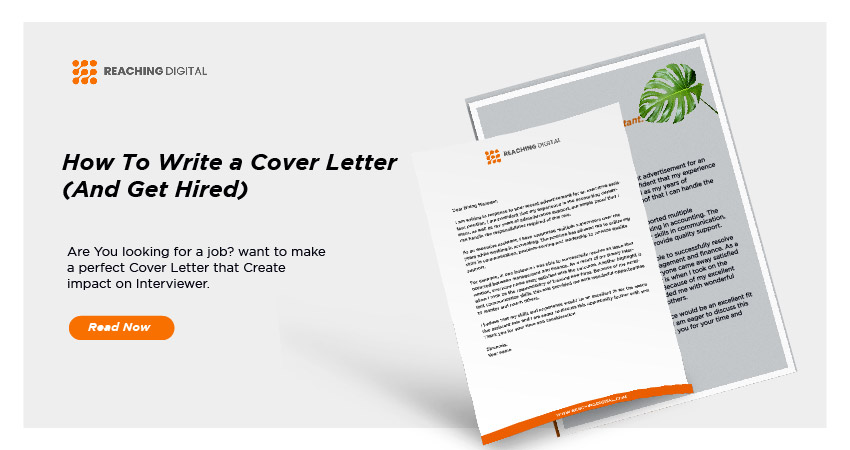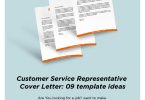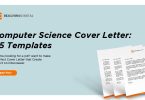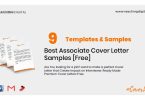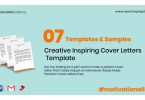Do you want to learn how to write a cover letter that will get you hired? If so, then this is the article for you! We’ll teach you everything there is to know about writing an effective cover letter. You’ll be able to use our tips and tricks in your next job application, no matter what industry or position you are applying for.
Whether it’s your first time writing a cover letter or if it has been years since your last one, we have all the information here that you need. So sit back and relax while we walk through each step of the process with ease! Once we finish up, not only will you know exactly what goes into a good cover letter but also why they are important in today’s world of business. And don’t worry – even if English isn’t your first language (or second), we’ve got some great examples from people just like yourself who were able to land their dream jobs using these techniques!
The purpose of a cover letter
A cover letter should be considered as part of your job application package. It is used to express your interest in an advertised position or to induct yourself into a company/organization by introducing yourself and explaining how you may benefit the company. The cover letter can also be seen as an opportunity for you to stand out from your competitors. A cover letter is an added advantage in the application process, as it sets you apart for when they consider you for employment or vacancies that are not advertised.
“I got my first job after college as a secretary. The boss was impressed, but he asked if I’d ever considered going to secretarial school. ‘You can type faster than I’ve ever seen,’ he said.”
Jacquelyn Mitchard, Milwaukee Journal Sentinel
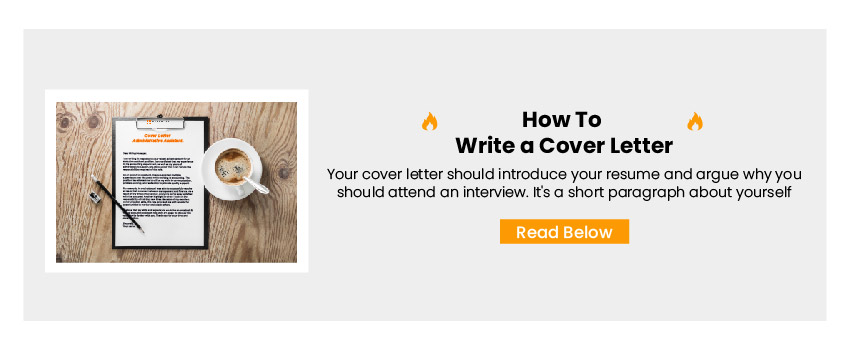
How To Write a Cover Letter
Cover letters are often overlooked as a means of introducing yourself to employers, but many hiring managers will judge your resume based on the quality and content of your cover letter. You don’t have much time to make an impact — typically less than 30 seconds. Yet it has the potential to determine whether you advance in the process, so your letter should be brief, concise and to the point.
Your cover letter should introduce your resume and argue why you should attend an interview. It’s a short paragraph about yourself and what you think makes you stand out from the crowd. It shouldn’t be longer than one page and shouldn’t include any irrelevant information or mistakes in grammar or spelling.
The best approach is to keep your letter brief and highlight your skills and qualifications that are relevant to the position you’re applying for. The following guidelines will help you write a cover letter that conveys the skills and qualities you bring to your new employer:
What makes me stand out from the crowd?
When writing a cover letter, it is important to demonstrate why you are qualified and worthy of an interview. You can do this by explaining how your skills and qualifications make you a great candidate for the job.
Start by reading the job description carefully. Identify specific qualities or characteristics mentioned in the advertisement, such as “strong oral and written communication skills”, “ability to work on a team” or ability to “work independently.” Next, decide how your strengths match these criteria and quote directly from the job description.
For example, you could write:
“My communication skills and experience working on a team makes me an excellent candidate for this position.”
Or
“Your job advertisement highlighted that it is important to be able to work independently as well as part of a team. I believe my experience in data entry, my strong attention to detail, and my ability to work independently would make me a great candidate for this position.”
Why are you the best fit?
Your letter should also convey why you’re the perfect person for the job. Think about what your previous experience, personality traits or skills can contribute to this role.
You can also use this opportunity to emphasize your interest in a career in the industry. For example, if you’re applying for a marketing role and have relevant experience, write:
“My previous experience in social media makes me an excellent candidate for this position.”
Or
“I am particularly interested in working in the field of Marketing and would welcome the opportunity to contribute my social media skills to your company.”
Why do you want this job?
Finally, it is important to remember that there must be a good fit between what you offer and what the employer is looking for. In other words, why do you want the position? Think about why you are suited to the role and why you want to work in this industry.
You may have to do some research on the company before writing your cover letter, but it could help you create a better opening sentence. For example, if you’re applying for an entry-level role at a financial firm that interests you, write something like:
“I am particularly interested in applying for your entry-level Financial Adviser position. Because I would like to be part of an organization that offers training and provides advancement opportunities.”
You can also use this sentence to show you’ve done some research on the company. If this is the case, mention something specific about what you found out during your research.
“After reading about your company, I found out that you offer free online training courses in stocks and shares to help staff gain further knowledge in this area.”
The key is to prove why you’re the best fit for the job. But without dwelling too much on what makes you different or unique. The focus should be on what you can do for your new employer, not the other way around.
What’s in it for me?
Once you’ve thoroughly researched this company and tailored your letter to suit their requirements. Make sure you show them why they should be interested in hiring you.
For example, if there are benefits or particular perks mentioned in the advertisement, This is a great opportunity to emphasize how you can contribute to these. Or if there’s a unique aspect to the job that really appeals, say so. You could write:
“I am particularly interested in applying for your entry-level Financial Adviser position. Because I would like to be part of an organization that offers training and provides advancement opportunities.”
Or
“Your advertisement mentioned that you offer free online training courses in stocks and shares to help your staff gain further knowledge in this area. I am particularly interested in taking these courses due to my interest in learning more about the financial sector.”
The most important thing, though, is keeping it short and sweet. If you manage to write a powerful cover letter in just a few paragraphs, you are much more likely to stand out to the recruiter.
What happens after I submit my application?
While it’s important to think about what will come across well within your cover letter. It’s also key not to forget the bigger picture. Your future employer is not just hiring you for your cover letter. They are looking to hire someone who is skilled in the role and suits their company.
For example, it might be tempting to highlight why you are an excellent fit for the position. But if your application includes spelling mistakes or incorrect dates, this will reflect poorly on you as a potential employee.
Remember: the goal of your cover letter is to get you an interview, not necessarily a job. You can call attention to your skills in your resume or discuss them in person during the course of the interview.
How long should a cover letter be?
When you’re applying for a job, including a cover letter with your resume is not only recommended—it’s practically required. The problem? Most people hate writing them because they don’t know what to say in a cover letter.
Where many first-time job applicants go wrong is thinking that the purpose of a cover letter is to summarize your resume. It’s not! A cover letter should be a persuasive essay. That tells the employer why you’re the perfect fit for the open position and how he or she will benefit from bringing you on board.
For example, if your goal is to be a tech writer. Your cover letter should include information about your writing skills and any technical knowledge. That could make you a more qualified candidate. If your goal is to be an information security specialist. Your cover letter should include information about the fact that you have a degree or certification in computer science and how it makes you a more valuable addition to the company. We’ll get more into how to write a great cover letter below.
First things first: How long should a cover letter be?
Most experts agree that your cover letter shouldn’t be any longer than one page. If it’s two pages, employers might wonder if you’re trying to pad your resume with unnecessary information.
Remember: The purpose of the cover letter is to get the employer interested enough in you to want to read your resume. Not to give them a blow-by-blow description of your employment history.
Keep in mind: A cover letter is not the place to list every single achievement and responsibility you’ve had during your career or make excuses for any poor performance on your resume.
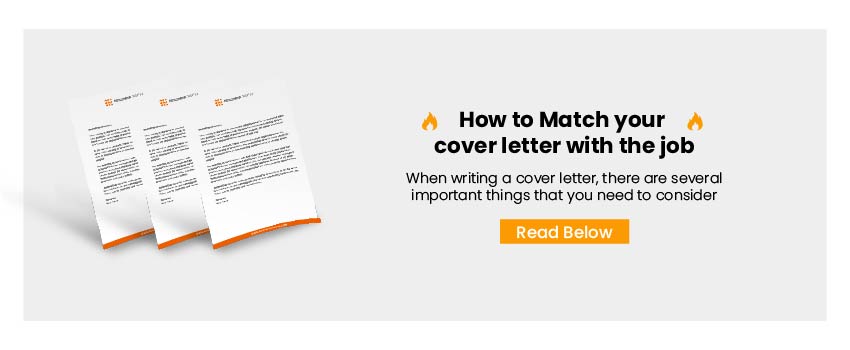
How to Match your cover letter with the job
As you may have seen, cover letters are back in fashion… But before you get too excited about that smart new look, it’s time to ask yourself a few questions. What is the purpose of your letter? Who are you writing it for? How can you tell if your letter will be successful?
Many people struggle with the creation of a cover letter. But it is not necessary to be completely confused when you are putting together all of your work experience and skills into an attractive document. And although this list cannot include every possible scenario. Here are some key points that will help you to get started.
1) Make the letter personal. If you are sending an application for a job opening, include your name in the letter. The recruiter knows that many people will be sending in their resumes for this post. But he or she would like to know who is applying personally. When it comes down to it, you are just another face in the crowd unless you can prove that you are different.
2) Customize your letter. If you are sending an application for a job opening, it’s important to make sure that the cover letter matches up with the specifications of the specific post. It may even be best to look at an example of a cover letter before you start preparing your own.
3) Get to the point. You have a few seconds – literally – to grab the recruiter’s attention, so your letter should be direct and concise. If you are applying for a specific post, it is vital that you take into account exactly what the company is looking for in an employee.
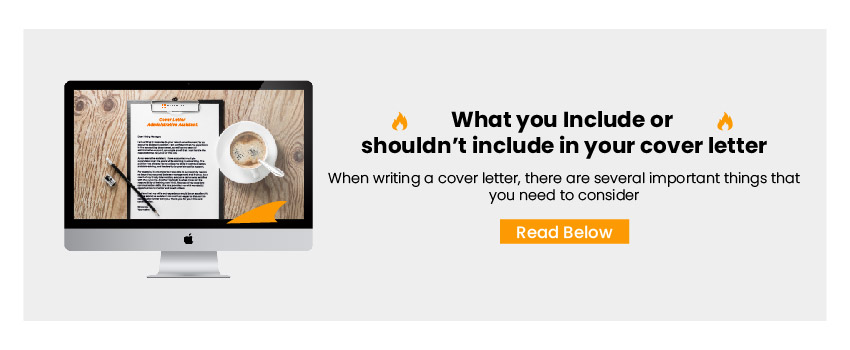
What to include in your cover letter
If you are looking to be employed in any field. Whether it is as a mechanic or an office worker, the first thing that people look for on your resume is your cover letter. This should contain three major components:
Cover Letter Introduction: You need to start out with an introduction about yourself and why you are qualified for the job. It works best if you mention your previous experience in the same field that you are applying for. You should also include some brief but concise information on any educational experience that is relevant to the professional area you are applying for.
Cover Letter Body: This is where everything begins to come together. So put your best foot forward and be sure to answer the questions fully while not missing any key points that may be asked for in the job description. Follow the guidelines that were given to you by whoever requested your information. Whether it was an online form or a person who has asked for your cover letter and resume.
Cover Letter Conclusion: Bring everything together with a conclusion about yourself and how you would show up at an interview if you are called in for one. If you have some questions that you would like to ask, This is the place where you should do it. Because it will give them a chance to see what kind of intelligence and character that you have.
Cover Letter Closing: Thank your reader for their time by closing out with a professional sign-off. You can use “Sincerely,” or if you feel more comfortable with a nickname. You can use “Warmest Regards,” or something of the like.
What you shouldn’t include in your cover letter
Dear Sir/Madam,
Thank you for your advert. I’m interested in the post of executive assistant at your company. I saw the advertisement on <website>. I have attached my CV.
It’s vital to find out exactly what information they are looking for so you can highlight it in your letter. A lot of people simply don’t achieve this and instead. They send a generic cover letter that may be suitable for several jobs or even worse, one that isn’t suited to any job at all!
The following is what you should NOT include in your cover letter:
- I’m writing to apply for the position of <job title>.
- I saw your advertisement on <website>, and I am very interested in the job.
- I have attached my CV to this letter.
- My résumé is enclosed with this letter.
Remember you are writing a cover letter just for this particular job. Don’t use it as a ‘one size fits all` and don’t simply attach your résumé. The risk of doing this is that the employer’s first impression of you might be to think. Here we go again – yet another one who doesn’t read the advert properly.
What Next?
If you’ve followed these steps, you should have written an effective cover letter. That gets the employer’s attention, shows off your skills and abilities, and ultimately gets you a job interview. Be proud of yourself for putting in the effort, but don’t get too comfortable just yet. Now is your opportunity to plan out what you’re going to wear. Learn about the company and really sell yourself during that all-important interview!
Read Our Guide: What is Cover Letter? Complete Guide To Get any Job.

